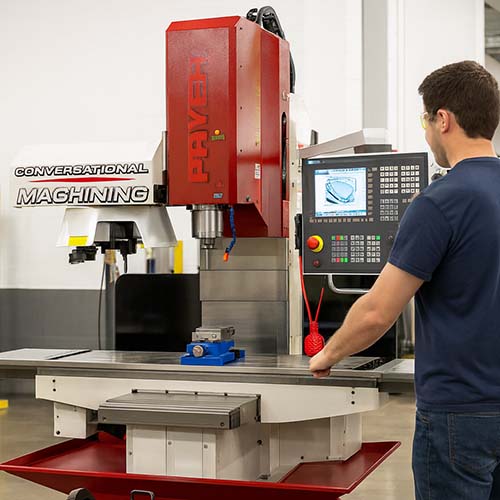Modern manufacturing depends on accuracy, efficiency, and repeatability. High-quality milling services play a critical role in producing precision components used in industrial equipment, automotive assemblies, aerospace systems, and custom steel fabrication projects. Whether producing a single prototype or a full production run, CNC milling technology allows manufacturers to achieve tight tolerances, complex geometries, and consistent results.
At Salco Engineering & Manufacturing, our milling services combine advanced CNC milling equipment with decades of fabrication expertise. From steel milling for heavy-duty industrial components to complex milling for intricate part designs, we deliver precision-engineered solutions tailored to demanding applications.
What Are Milling Services?
Milling services involve the use of rotating cutting tools to remove material from a workpiece in a controlled and precise manner. Unlike forming or casting processes, milling is a subtractive method that shapes raw material—often steel—into finished components with exact specifications.
CNC milling enhances this process by using computer-controlled programming to guide cutting tools along multiple axes. This automation ensures consistent accuracy, improved efficiency, and the ability to produce complex parts that would be difficult to achieve through manual machining.
Professional milling services are commonly used for:
- Machining structural steel components
- Creating precision mounting plates and brackets
- Producing tooling and fixtures
- Manufacturing custom machine parts
- Developing prototype components for testing
Why CNC Milling Is Essential in Modern Manufacturing
CNC milling has transformed the machining industry by improving speed, precision, and repeatability. For companies requiring high-performance components, CNC milling offers significant advantages over traditional machining methods.
Precision and Repeatability
CNC milling machines operate based on digital programming, ensuring each cut follows exact design specifications. Once programmed, the system can replicate parts consistently across multiple production runs. This is especially valuable for manufacturers producing components that must fit seamlessly into larger assemblies.
Capability for Complex Milling Operations
Complex milling involves machining intricate shapes, tight internal corners, detailed contours, and multi-surface features. Multi-axis CNC milling machines allow for simultaneous movement across different planes, enabling the creation of sophisticated geometries with exceptional accuracy.
Industries such as aerospace, automotive, and automation frequently rely on complex milling to manufacture precision components that require advanced detailing and dimensional control.
Efficiency in Steel Milling Applications
Steel milling demands robust equipment and expertise due to the strength and hardness of steel materials. CNC milling machines are designed to handle carbon steel, stainless steel, and specialty alloys efficiently while maintaining accuracy.
For projects involving heavy-duty structural components or industrial-grade assemblies, professional steel milling ensures durability and long-term performance.
Steel Milling for Industrial Applications
Steel remains one of the most widely used materials in manufacturing due to its strength, versatility, and durability. Milling services focused on steel milling allow manufacturers to create components that withstand demanding environments.
Common steel milling applications include:
- Base plates and mounting structures
- Machine housings and enclosures
- Industrial equipment components
- Material handling system parts
- Precision frames and support brackets
At Salco, our milling services integrate seamlessly with custom steel fabrication, allowing us to machine precision components that move directly into forming, welding, and assembly processes without delays.
Integrating CNC Milling with Design and Prototyping
One of the most powerful advantages of CNC milling is its compatibility with digital design platforms. Using CAD/CAM software, engineers can create detailed 3D models that translate directly into machine instructions.
Salco’s team leverages design and prototyping services to refine part geometry before production begins. This digital workflow reduces material waste, shortens development cycles, and ensures that complex milling operations are executed accurately the first time.
For prototype development, CNC milling allows rapid iteration and refinement, helping clients move from concept to production-ready components efficiently.
Advantages of Professional Milling Services
Improved Accuracy and Tolerances
High-quality milling services achieve tight tolerances required for precision assemblies. CNC milling reduces human error and maintains dimensional consistency, even in demanding production environments.
Reduced Lead Times
Automation and multi-axis capability allow CNC milling machines to perform multiple operations in a single setup. This efficiency reduces cycle times and speeds up project completion without sacrificing quality.
Versatility Across Industries
Milling services support a wide range of industries, including:
- Automotive manufacturing
- Aerospace production
- Medical device fabrication
- Food processing equipment manufacturing
- Material handling system production
In addition to machining, Salco integrates CNC milling with complementary capabilities such as MIG and TIG welding and precision forming to produce fully assembled components.
Complex Milling for High-Performance Components
Complex milling projects require advanced tooling, programming expertise, and careful material selection. Whether machining slots, pockets, threaded features, or intricate contours, CNC milling enables manufacturers to produce highly detailed parts without compromising strength.
For operations involving automation systems, robotics integration, or specialized machinery, complex milling ensures each component meets exact performance requirements.
Salco’s machining team evaluates part geometry, material characteristics, and load demands to determine the most efficient milling strategy—ensuring strength, reliability, and optimal performance.
Why Choose Salco for Milling Services?
Salco Engineering & Manufacturing combines decades of fabrication expertise with advanced CNC milling capabilities. Our in-house machining operations support both standalone milling projects and fully integrated fabrication solutions.
By keeping milling services under one roof, we provide:
- Consistent quality control
- Reduced outsourcing delays
- Streamlined project timelines
- Integrated machining and fabrication
- Scalable production capacity
Whether you need steel milling for heavy-duty components or complex milling for precision applications, our team delivers reliable, repeatable results built to meet your specifications.
Request Precision Milling Services for Your Next Project
If your operation requires accurate, high-performance components, professional milling services can deliver the precision and efficiency your project demands. From CNC milling of complex geometries to durable steel milling for industrial applications, Salco Engineering & Manufacturing provides dependable machining solutions backed by experience and technical expertise.
Contact Salco Engineering & Manufacturing today to discuss your milling requirements and request a quote. Let our team help you transform raw steel into precision-engineered components designed for performance and longevity.



